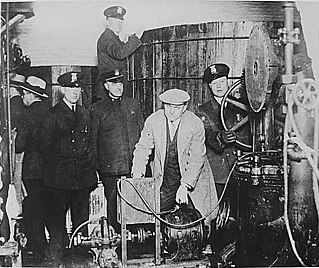
The Eighteenth Amendment of the United States Constitution established the prohibition of "intoxicating liquors" in the United States. The amendment was proposed by Congress on December 18, 1917, and was ratified by the requisite number of states on January 16, 1919. The Eighteenth Amendment was repealed by the Twenty-first Amendment on December 5, 1933.

The temperance movement is a social movement against the consumption of alcoholic beverages. Participants in the movement typically criticize alcohol intoxication or promote complete abstinence (teetotalism), with leaders emphasizing alcohol's negative effects on health, personality, and family life. Typically the movement promotes alcohol education as well as demands new laws against the selling of alcohols, or those regulating the availability of alcohol, or those completely prohibiting it. During the 19th and early 20th centuries, the temperance movement became prominent in many countries, particularly English-speaking and Scandinavian ones, and it led to Prohibition in the United States from 1920 to 1933.
The Temperance (Scotland) Act 1913 is an Act of the Parliament of the United Kingdom under which voters in small local areas in Scotland were enabled to hold a poll to vote on whether their area remained "wet" or went "dry". The decision was made on a simple majority of votes cast.
The 1957 Alberta Liquor Plebiscite was a province-wide plebiscite conducted in Alberta, Canada and it was held on October 30, 1957. Unlike the other three plebiscites held in Alberta, the 1957 vote was not held in conjunction with a provincial election. At the time, the Alberta Liquor Control Board operated only a few stores from which liquor could be legally purchased. The plebiscite asked voters in every district if they were in favour of adding extra ALCB outlets.

Augustus Owsley Stanley I was an American politician from Kentucky. A member of the Democratic Party, he served as the 38th Governor of Kentucky and also represented the state in both the U.S. House of Representatives and the U.S. Senate. From 1903 to 1915, Stanley represented Kentucky's 2nd congressional district in the House of Representatives, where he gained a reputation as a progressive reformer. Beginning in 1904, he called for an antitrust investigation of the American Tobacco Company, claiming they were a monopsony that drove down prices for the tobacco farmers of his district. As a result of his investigation, the Supreme Court of the United States ordered the breakup of the American Tobacco Company in 1911. Stanley also chaired a committee that conducted an antitrust investigation of U.S. Steel, which brought him national acclaim. Many of his ideas were incorporated into the Clayton Antitrust Act.
The prohibition of alcohol in Canada arose in various stages, from local municipal bans in the late 19th century, to provincial bans in the early 20th century, and national prohibition from 1918 to 1920. The relatively large and powerful beer and alcohol manufacturing sector, and the huge working class that purchased their products, failed to convince any of the governments to reverse their stance on prohibition. Most provinces repealed their bans in the 1920s, though alcohol was illegal in Prince Edward Island from 1901 to 1948. By comparison the temperance act in Ontario ran from 1916 to 1927.
An Ontario prohibition referendum was held on December 4, 1902, under the Liquor Act, on the legality of alcoholic beverages and the implementation of prohibition in the province. Though the referendum passed, a majority of half of the voters in the 1898 election did not support the motion and prohibition was not introduced. Prohibition would not occur in Ontario until 1916.
An Ontario prohibition referendum was held on October 20, 1919, on the repeal of the prohibition of alcoholic beverages. Prohibition had been passed by the provincial government in 1916 under the Ontario Temperance Act, though a clause required a referendum to be held on the issue after three years.
An Ontario prohibition referendum was held on October 23, 1924 on the repeal of the Ontario Temperance Act. The referendum was brought about by a clause in the Act, which permitted the possible repeal of prohibition by a majority vote.
Vermilion is a former provincial electoral district in Alberta which existed from 1905 to 1921.
The Quebec referendum on the prohibition of alcohol, held on April 10, 1919, considered the legalization of the sale of beer, cider and wine in the province of Quebec, Canada. The 'yes' side won with 78.62% of the votes.

Prohibition in the United States was a nationwide constitutional ban on the production, importation, transportation, and sale of alcoholic beverages from 1920 to 1933.

Alcohol prohibition in India is in force in the states of Bihar, Gujarat, Mizoram and Nagaland as well as in the Union Territory of Lakshadweep. All other Indian states and union territories permit the sale of alcohol.
Prohibition in Iceland went into effect in 1915 and lasted, to some extent, until 1 March 1989. The ban had originally prohibited all alcohol, but from 1922 legalized wine and in 1935 legalized all alcoholic beverages except beer with more than 2.25% alcohol content. As in many other states with prohibition, "illegal brewing and smuggling of alcoholic beverages were widespread during the ban."
Hand Hills was a provincial electoral district in Alberta, Canada. It was mandated to return a single member to the Legislative Assembly of Alberta from 1913 to 1963. It was abolished prior to the 1963 Alberta general election due to redistribution, in favour of the new electoral district of Hand Hills-Acadia.

A plebiscite on prohibition was held in Canada on 29 September 1898, the first national referendum in the country's history. The Liberal government had made an election promise in 1896 to provide an opportunity for Canadians to register their opinions about the sale of alcohol. The non-binding plebiscite saw 51.3% in favour of introducing prohibition, although turnout was only 44%. A majority voted for its introduction in all provinces except Quebec, where 81.2% opposed it.
A referendum on creating a state monopoly on alcoholic beverages was held in the Faroe Islands on 8 November 1973. The proposal was rejected by 62% of voters, equating to 37.7% of registered voters, above the 33% quorum required for rejection. Prohibition was eventually lifted in 1992.

BC Liquor Stores are a chain of crown corporation retail outlets operated by the British Columbia Liquor Distribution Branch to distribute alcoholic beverages in the province of British Columbia, Canada. They are accountable to the Attorney General of British Columbia. BC Liquor Stores currently operate 196 locations across the province. The chain was established in June 1921, following the result of a plebiscite in favour of liquor availability through government liquor stores. Prior to the plebiscite, alcohol had been illegal through the Prohibition Act, introduced on May 23, 1916, with exceptions to sacramental, medicinal or industrial purposes.

Medicinal Liquor Prescriptions Act of 1933 is a United States federal statute establishing prescription limitations for physicians possessing a permit to dispense medicinal liquor. The public law seek to abolish the use of the medicinal liquor prescription form introducing medicinal liquor revenue stamps as a substitution for official prescription blanks.









